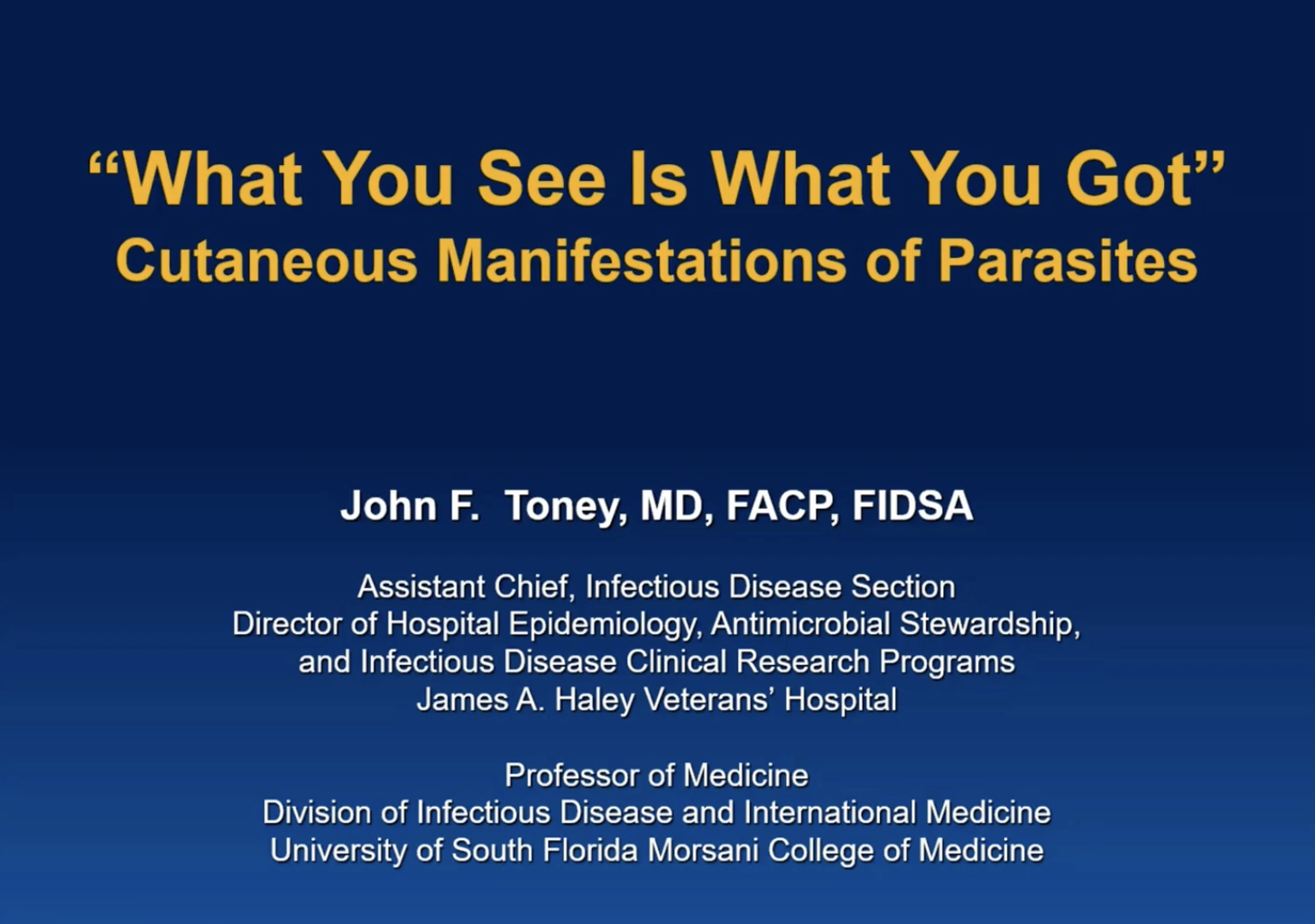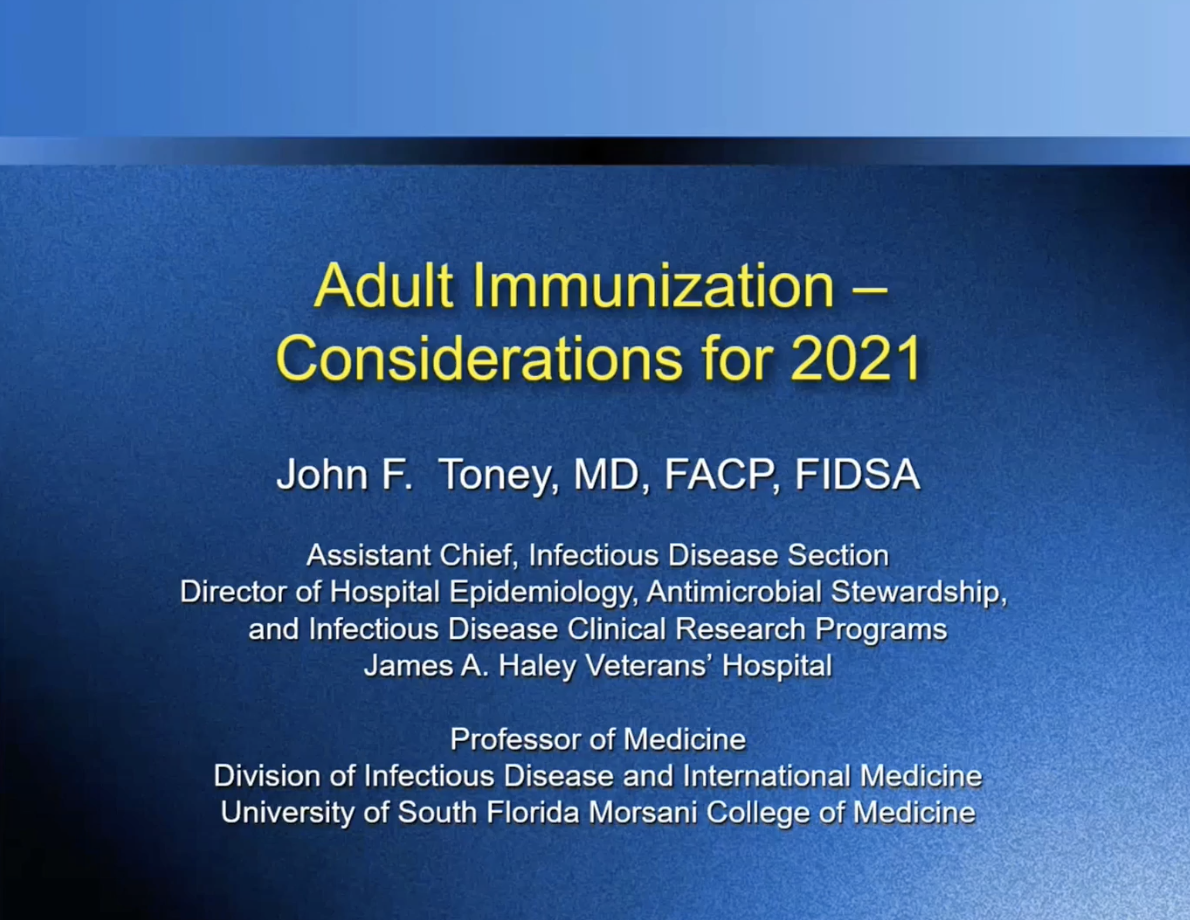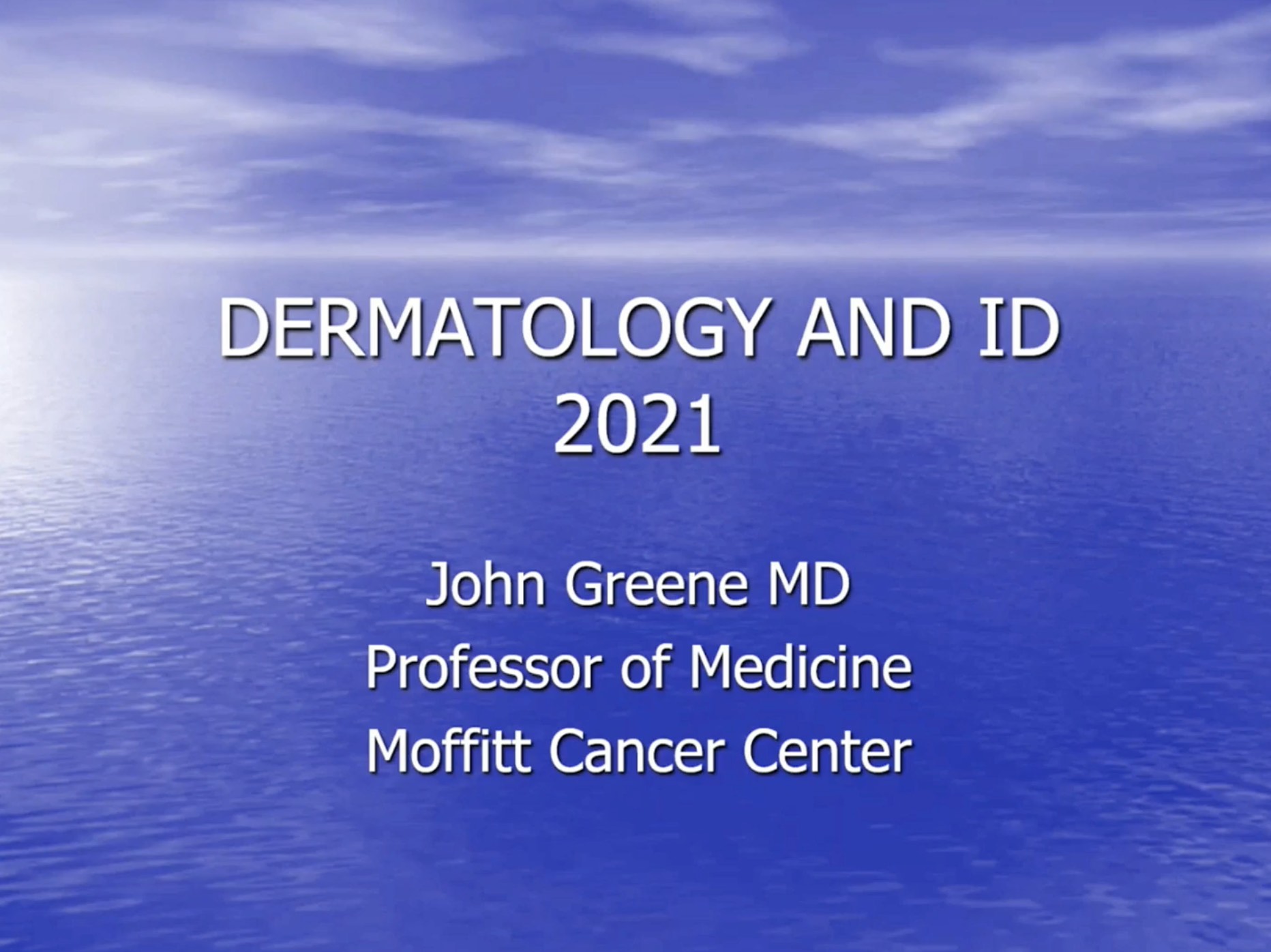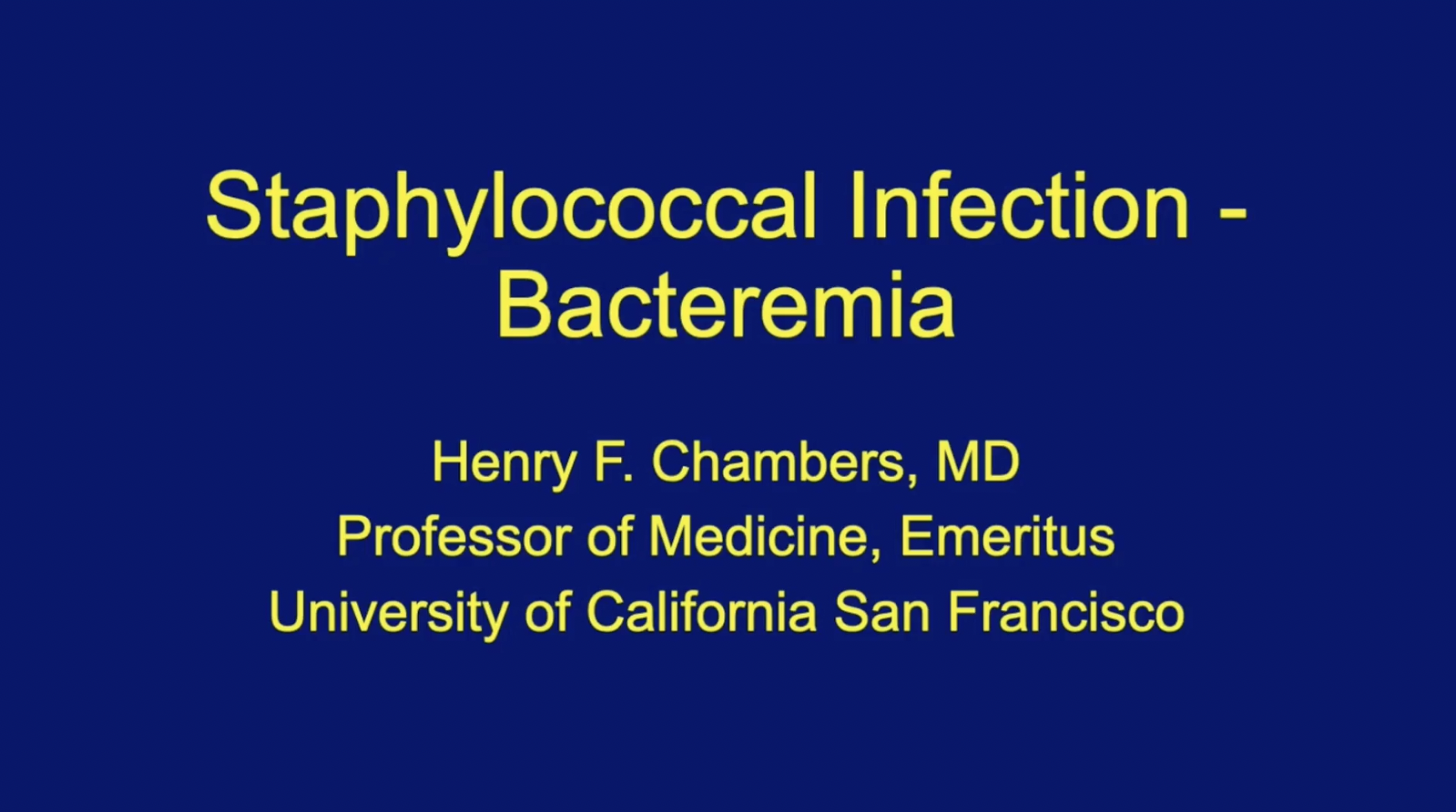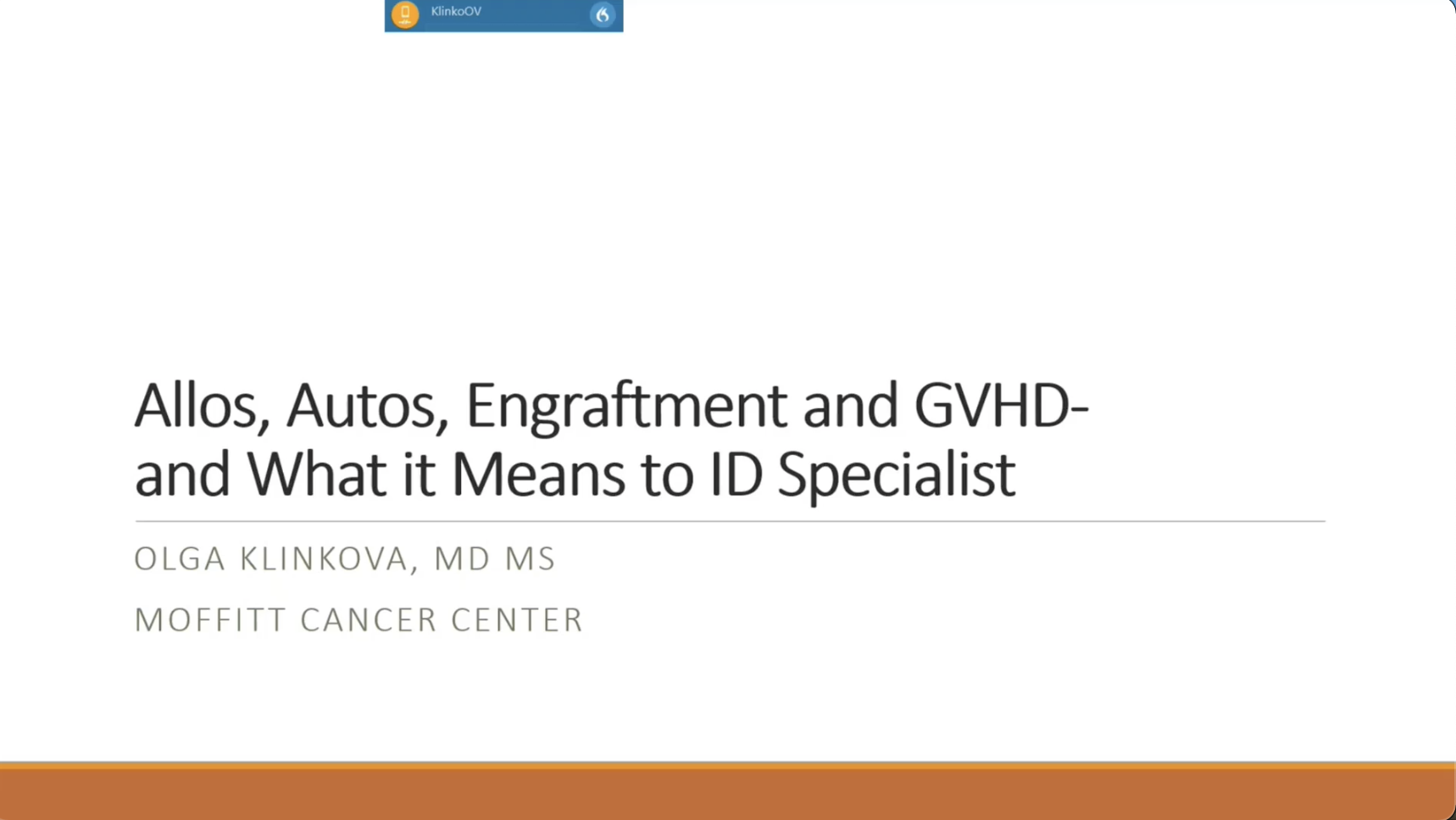Dr. John Toney, Professor of Medicine at the James A Haley Veterans Hospital, focuses upon infections and infestations of the skin associated with parasites. Topics discussed include scabies, cutaneous larva migrans, human pediculosis, Lyme borreliosis, trypanosomiasis, rickettsial disease, leishmaniasis, bedbugs, and myiasis. From a lecture recorded in January 2022.
Archives
Clostridium Difficile Treatment: Focus on the New Guidelines
Dr. Mercurio, an ID Clinical Pharmacy Specialist at the James A Haley Veterans Hospital, presents an update on Clostridium Difficile infection (CDI). Dr. Mercurio begins by sharing a timeline of the history of C difficile treatment. She then reviews the epidemiology of this common hospital pathogen. Next, she discusses the clinical definition of CDI. Dr. Mercurio next relates changes to the c difficile recommendations in the 2017 and 2021 guidelines. Finally, she discusses later generation treatments including Fidaxomicin and Bezlotoxumab. From a presentation recorded in August 2021.
Adult Immunization Update for 2021-2022
Dr. John Toney, Director of Epidemiology at the James A Haley Veterans Hospital in Tampa, FL., presents this update on adult immunizations. He begins with an overview of recommended adult immunizations. Next, he discusses pneumococcal vaccines. Following this, Dr. Toney differentiates the different Flu vaccines, including the current vaccine for the 2021-2022 year. He also mentions potential universal flu vaccines currently under investigation. Other vaccines discussed include TDAP, the different Varicella zoster vaccines, Meningococcal, HBV, and HPV vaccines. Lastly, several helpful case studies are presented.
Dermatology and ID 2021
Dr. John Greene, MD, Chief of Infectious Diseases at Moffitt Cancer Center and Research Institute, presents this fast-paced photo review of various infectious disease related syndromes. Topics covered include drug-related photosensitivity conditions, fungal skin infections, viral exanthems, zoonotic dermatoses, bite-related skin infections, sexually-transmitted infections, Non-tuberculous mycobacterial skin infections, and contact dermatitis.
Zoonoses
Dr. John Greene, Chief of Infectious Diseases at Moffitt Cancer Center and Research Institute, shares a photo review of Zoonosis syndromes. Topics presented include tick-borne infections, Bartonellosis, Louse-borne infections, Rickettsioses (Rocky Mountain Spotted Fever, Rickettsial pox, etc), Coxiella, Ehrlichia, and Relapsing Fever. Dr. Greene concludes the talk by covering Tularemia, the Plague (Yersinia Pestis), Orf, and the non-venereal Treponematoses.
Antimicrobial Dosing in Obesity
Dr Jaela Fredenrich, ID Clinical Pharmacist at the James A Haley Veterans Hospital in Tampa, FL, discusses the differences that a clinician encounters when dosing antibiotic agents for patients with higher than average BMI values. She begins by describing the reasons why obese patients require special antibiotic dosing, and how the average weight of the typical U.S. adult has changed in the past several decades, making more patients fall into this category. Next, she discusses the specifics of the AUC/MIC concentration-time curve as it applies to aminoglycosides, vancomycin and beta lactams. The differences in volume of distribution for various classes of antibiotics is discussed next. Weight based versus fixed dosing for different antibiotic classes is also covered. Lastly the best resources for guidance in antibiotic dosing are shared with the audience.
Staphylococcal Infection: Bacteremia
Dr. Chambers, Professor of Medicine at the University of California, San Francisco, presents a state of the art lecture on current trends in the management of Staphylococcal bacteremia. Dr. Chambers begins by discussing risk factors leading to a poor outcome with Staphylococcus aureus bacteremia. He next discusses the role of Echocardiography (including 2D echo and TEE) in the diagnosis of endocarditis and when to use each modality in a given patient. Next, he contrasts the therapeutic management of both methicillin susceptible and methicillin resistant Staphylococcus aureus. Topics also discussed include the use of oral step down therapy in the treatment of endocarditis and bacteremia, the appropriate duration of treatment courses for bacteremia (both complicated and uncomplicated), and the use of combination antibiotic regimens for treating bacteremia infections.
Primer on the Primary Immunodeficiencies
Dr. Walter, Division Chief of the Department of Pediatric Allergy and Immunology at Johns Hopkins All Children’s Hospital, presents this basic review of Immunology. Dr. Walter begins by reviewing the basic classification of general immunodeficiency syndromes, and then covers the initial work-up for patients who are suspected as having an immune system deficiency. She then discusses signs and syndromes in specific patients that could suggest a primary immunodeficiency. Next, she discusses antibody deficiency syndromes and autoantibodies, She closes by discussing a specific immunodeficiency case with relevant details highlighted within the presentation.
Intro to OB/GYN Infections
Dr. Ju Hee Katzman, Assistant Professor of Infectious Diseases at the University of South Florida, presents an overview of the infectious diseases syndromes that can complicate the intrapartum or post-partum period. Dr. Katzman begins her presentation by discussing chorioamnionitis. She then reviews two post-partum syndromes, endometritis and refractory post-partum fever of undetermined origin. Next, Dr. Katzman discusses infections after perineal lacerations, including simple cases and more complicated ones involving deeper tissue involvement. Lastly, the treatment of UTIs in the peri-partum period is discussed, and Dr. Katzman closes by discussing post-abortal infections and the treatment of Group B Streptococcus agalactiae. Utilizing PollEverywhere, the material is presented in an interactive format.
Guide to Autos, Engraftment, and GVHD in Stem Cell Transplant Recipients
Dr. Olga Klinkova, Infectious Diseases Practitioner at Moffitt Cancer Center and Research Institute in Tampa, FL, reviews the basics of Stem Cell Transplantation (SCT) from an Infectious Diseases perspective. She begins by reviewing the indications for SCT, and then discusses the basic types of SCT based upon donor/recipient characteristics (matched related, matched unrelated, etc.) She then differentiated the timelines between autologous and allogeneic transplants. Next, she discusses Graft versus Host disease and its consequences to the SCT patient. Dr. Klinkova then closes by covering prophylaxis strategies for stem cell transplant recipients. From a lecture recorded in October 2021.
